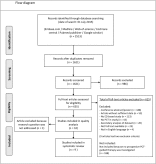Procalcitonin-guided therapy for the initiation of antibiotics in the emergency department: a systematic review
Affiliations
- Department of Emergency Medicine, Erasmus University Medical Center, ‘s-Gravendijkwal 230, 3015CE, Rotterdam, the Netherlands
Correspondence
- Corresponding author at: Erasmus University Medical Center, Spoedeisende hulp, Nc019, Postbus 2040, 3000CA, Rotterdam, the Netherlands. Tel.: +31 10 7030557.

Affiliations
- Department of Emergency Medicine, Erasmus University Medical Center, ‘s-Gravendijkwal 230, 3015CE, Rotterdam, the Netherlands
Correspondence
- Corresponding author at: Erasmus University Medical Center, Spoedeisende hulp, Nc019, Postbus 2040, 3000CA, Rotterdam, the Netherlands. Tel.: +31 10 7030557.
Affiliations
- Department of Emergency Medicine, Erasmus University Medical Center, ‘s-Gravendijkwal 230, 3015CE, Rotterdam, the Netherlands
Affiliations
- Department of Emergency Medicine, Erasmus University Medical Center, ‘s-Gravendijkwal 230, 3015CE, Rotterdam, the Netherlands
- Institute of Health Policy and Management (iBMG), Erasmus University, Burgemeester Oudlaan 50, 3062PA, Rotterdam, the Netherlands
Affiliations
- Department of Emergency Medicine, Erasmus University Medical Center, ‘s-Gravendijkwal 230, 3015CE, Rotterdam, the Netherlands
Affiliations
- Department of Internal Medicine, Erasmus University Medical Center, ‘s-Gravendijkwal 230, 3015CE, Rotterdam, the Netherlands
- Department of Viroscience, Erasmus University Medical Center, ‘s-Gravendijkwal 230, 3015CE, Rotterdam, the Netherlands
Affiliations
- Department of Internal Medicine, Erasmus University Medical Center, ‘s-Gravendijkwal 230, 3015CE, Rotterdam, the Netherlands
 Article Info
Article Info
To view the full text, please login as a subscribed user or purchase a subscription. Click here to view the full text on ScienceDirect.

Fig. 1
Flow diagram
Abstract
Background
Procalcitonin (PCT) is a new biomarker with a higher accuracy in the diagnosis of bacterial infections. Utilization of PCT may reduce the number of unnecessary antibiotics prescribed to patients, and consequently may decrease the rise in antibiotic resistance.
The aim of this systematic review is to determine if a PCT-guided algorithm can safely reduce the number of antibiotics prescribed to all patients with a suspected of infection in the emergency department(ED).
Methods
MEDLINE, EMBASE, Web-of-science, COCHRANE central, PubMed publisher and Google scholar were searched. Two reviewers performed the screening independently. The QUADAS 2 tool was used to assess quality.
Results
In total, 1621 articles were screened. Nine articles were included in the analysis. In the six studies on adult patients, only patients with respiratory tract infections were investigated. In these studies, a cut-off value of 0.25mcg/L was used, and PCT-guided therapy reduced the number of prescribed antibiotics significantly. Three studies were on pediatric patients, two on fever without source, and one on respiratory complaints. PCT-guided therapy did not reduce antibiotic prescription in children. PCT-guided therapy did not result in an increase in adverse events in any of the studies.
Discussion
PCT-guided therapy in the ED is only studied in subpopulations, where it was effective and safe in adult patients with respiratory tract infections, and not effective but safe nonetheless in specific pediatric populations. Nonadherence is a significant problem in prospective PCT-guided therapy studies. There is not enough evidence to use PCT-guided therapy in a general ED population.
To access this article, please choose from the options below
Purchase access to this article
Claim Access
If you are a current subscriber with Society Membership or an Account Number, claim your access now.
Subscribe to this title
Purchase a subscription to gain access to this and all other articles in this journal.
Institutional Access
Visit ScienceDirect to see if you have access via your institution.
PROSPERO Systematic review registration: CRD42015023534
Funding: This study was completed without financial support
Presentation at meetings: The results of this study have not been presented at a scientific meeting.
Related Articles
Searching for related articles..


